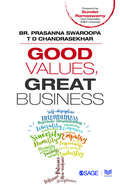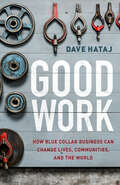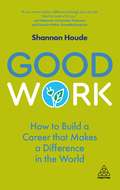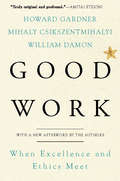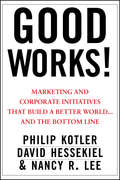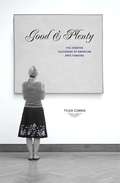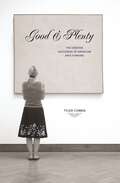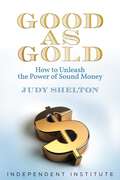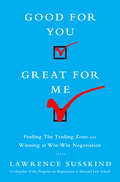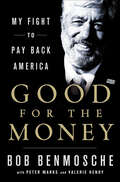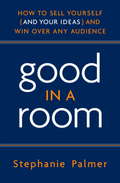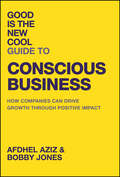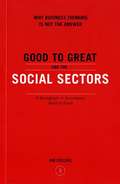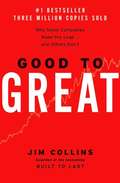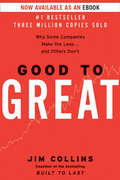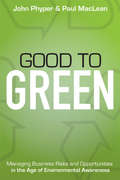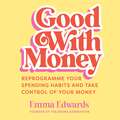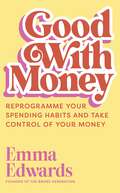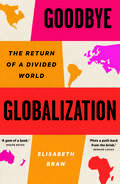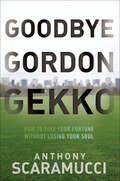- Table View
- List View
Good Values, Great Business
by Br. Prasanna Swaroopa T D ChandrasekharThere is scepticism regarding the role of values in business. Values are at best implemented as checklists and codes of conduct and not as a fundamental way of enhancing stakeholder well-being, including employees, customers, vendors and the larger ecosystem. Organizations take note of values only when instances of ethical malpractices surface—be it financial, gender-based, intellectual property and so on. Values bring out the best in individuals, teams and the organization by establishing a strong foundation for actions and interactions. Right from improving the effectiveness of day-to-day meetings to creating a culture of creativity and innovation, values form the substratum for every aspect and functioning of the organization. This book establishes a strong rationale for instilling values in business organizations by demonstrating how values are the foundation for excellence, productivity, creativity, quality and for creating a stress-free work environment. By presenting experiences, challenges, inspirations and conflicts regarding values, the book will help employees at all levels strengthen their conviction regarding values at the workplace. Addressing managers at all levels and the leadership, the book pragmatically discusses how to build and nurture a values-based culture in the organization. The authors examine the subject of values from the point of view of each individual’s personal journey, and finally delve into the crucial topic of values-based leadership, which is indispensable for a culture of values
Good Work: How Blue Collar Business Can Change Lives, Communities, and the World
by Dave HatajWhat Can Blue-Collar Business Teach Us About Work and Faith?The faith and work conversation is alive and well, but most resources focus on white-collar jobs, neglecting the majority of the workforce. When Dave Hataj realized he needed to go home and take over the family gear shop, he didn&’t expect it to become a spiritually transformative season of his life. Yet as he began to think about what it meant to be a Christian in business, he discovered just how much our work matters to God and how blue-collar business can change people, communities, and even the world.Drawing on the stories of his business, Edgerton Gears, Dave teaches you how to cultivate true inner goodness, meaning, and mission at work—no matter what you do. Your workplace can and should be a place of significance.
Good Work: How Blue Collar Business Can Change Lives, Communities, and the World
by Dave HatajWhat Can Blue-Collar Business Teach Us About Work and Faith?The faith and work conversation is alive and well, but most resources focus on white-collar jobs, neglecting the majority of the workforce. When Dave Hataj realized he needed to go home and take over the family gear shop, he didn&’t expect it to become a spiritually transformative season of his life. Yet as he began to think about what it meant to be a Christian in business, he discovered just how much our work matters to God and how blue-collar business can change people, communities, and even the world.Drawing on the stories of his business, Edgerton Gears, Dave teaches you how to cultivate true inner goodness, meaning, and mission at work—no matter what you do. Your workplace can and should be a place of significance.
Good Work: How to Build a Career that Makes a Difference in the World
by Shannon HoudeDo you want to have a positive impact on the world? Do you want to have a successful career that makes a difference? In short... do you want to do Good Work? Let this step-by-step guide show you how. Packed with useful tools and exercises, this step-by-step guide will help you figure out your passion and purpose, and how to effectively harness it to make real and positive change - on the world, and on your career. Whether you want to battle climate change, promote diversity and inclusion, work in sustainability - or if you're not sure, but just want to leave things a little better at the end of every work day - let this book support you in turning that passion into action. Written by corporate responsibility consultant and certified coach Shannon Houde, this book is part career guide and part job search help - and all purpose-driven. From understanding what the 'purpose economy' is and how you fit into it, to what jobs to go for and how to land them, Good Work is the helping hand you need to make a career out of changing the world.
Good Work: When Excellence and Ethics Meet
by Howard GardnerWhat does it mean to carry out "good work"? What strategies allow people to maintain moral and ethical standards at a time when market forces wield unprecedented power and work life is being radically altered by technological innovation? These are the questions at the heart of this important collaboration by three leaders in psychology. Enlivened with stories of real people facing hard decisions, Good Work offers powerful insight into one of the most important issues of our time and, indeed, into the future course of science, technology, and communication.
Good Works!
by Philip Kotler Nancy Lee David HessekielBusinesses can do well by doing good -- Kotler, Hessekiel, and Lee show you how!Marketing guru Philip Kotler, cause marketing authority David Hessekiel, and social marketing expert Nancy Lee have teamed up to create a guide rich with actionable advice on integrating marketing and corporate social initiatives into your broader business goals.Businesspeople who mix cause and commerce are often portrayed as either opportunistic corporate "causewashers" cynically exploiting nonprofits, or visionary social entrepreneurs for whom conducting trade is just a necessary evil in their quest to create a better world. Marketing and corporate social initiatives requires a delicate balancing act between generating financial and social dividends. Good Works is a book for business builders, not a Corporate Social Responsibility treatise. It is for capitalists with the hearts and smarts to generate positive social impacts and bottom-line business results.Good Works is rich with actionable advice on integrating marketing and corporate social initiatives into your broader business goals.Makes the case that purpose-driven marketing has moved from a nice-to-do to a must-do for businessesExplains how to balance social and business goalsAuthor Philip Kotler is one of the world's leading authorities on marketing; David Hessekiel is founder and President of Cause Marketing Forum, the world's leading information source on how to do well by doing good; Nancy Lee is a corporate social marketing expert, and has coauthored books on social marketing with Philip KotlerWith Good Works, you'll find that you can generate significant resources for your cause while achieving financial success.
Good Writing: It Begins with Principles
by Harvard Business Review PressEffective communication and good writing rest on a foundation of basic principles. From having a clear purpose to considering a delivery strategy, this chapter examines each of these principles as it relates to written communication.
Good and Plenty: The Creative Successes of American Arts Funding
by Tyler CowenAt one time or another nearly every sector of the American economy has been branded as a market failure. Such claims are probably the most important arguments for government support or intervention. The private sector may be deemed incapable of solving the so-called free rider problem or may price public goods in such a way as to insufficiently exclude nonpayers. Assertions of market failure are usually based upon Paul Samuelson's theory of public goods & externalities. Public Goods & Market Failures both develops that theory & challenges the conclusion of many economists & policy makers that market failures cannot be corrected by market forces.
Good and Plenty: The Creative Successes of American Arts Funding
by Tyler CowenAmericans agree about government arts funding in the way the women in the old joke agree about the food at the wedding: it's terrible--and such small portions! Americans typically either want to abolish the National Endowment for the Arts, or they believe that public arts funding should be dramatically increased because the arts cannot survive in the free market. It would take a lover of the arts who is also a libertarian economist to bridge such a gap. Enter Tyler Cowen. In this book he argues why the U.S. way of funding the arts, while largely indirect, results not in the terrible and the small but in Good and Plenty--and how it could result in even more and better. Few would deny that America produces and consumes art of a quantity and quality comparable to that of any country. But is this despite or because of America's meager direct funding of the arts relative to European countries? Overturning the conventional wisdom of this question, Cowen argues that American art thrives through an ingenious combination of small direct subsidies and immense indirect subsidies such as copyright law and tax policies that encourage nonprofits and charitable giving. This decentralized and even somewhat accidental--but decidedly not laissez-faire--system results in arts that are arguably more creative, diverse, abundant, and politically unencumbered than that of Europe. Bringing serious attention to the neglected issue of the American way of funding the arts, Good and Plenty is essential reading for anyone concerned about the arts or their funding.
Good as Gold: How to Unleash the Power of Sound Money
by Judy SheltonFrom financial crises, to pandemic price-spikes, to recurring cycles of inflation, everyone agrees: the economy has seen better days.But as soon as pundits and politicians start discussing economics, things get murky. Most books ask more questions than they answer. Most books...but not this one. Judy Shelton—Senior Fellow at Independent Institute, former Chairman of the National Endowment for Democracy, and critically acclaimed monetary economist—has written a book with answers. And not a moment too soon. With clarity and moral courage, Shelton charts the course to a brighter future. She&’s one of the few economists bold enough to challenge the inflationary policies of the Federal Reserve, emphasizing how today&’s policies enrich elites at the expense of—you guessed it—poor and middle-class Americans. This, Shelton insists, must end. And it can end—easily. But Shelton doesn&’t stop there. Her vision is for not only America but also for people around the world. Global, economic upliftment, she insists, need not come at the expense of domestic prosperity. We can have both—but not without a sound and stable U.S. currency. And history is very clear on this point. When the U.S. dollar is backed by gold, America prospers, and so does the rest of the world. In this book, Shelton casts a powerful vision that is as revolutionary as it is time-tested...a vision that shows how the future American dollar can perform as good as gold... ...or even better. But this is no curmudgeonly demand to return to the gold standard of yore. Neither is it a demand to return to the Bretton Woods era. Instead, Shelton offers something new: an explanation of how we can use gold for a new international monetary order. Step by step, she lays out how gold can provide a universal measure of value across borders, create new financial opportunities, and dramatically increase prosperity around the world. If you care about the poor, rich, and everyone in between, you have to read this book ... and discover: · how price stability functions as the foundation for productive economic growth; · how political freedom and economic freedom are fundamentally linked ... and how one cannot exist without the other; · how to reconcile the stability of America&’s domestic currency in a global context; · the proper role of government in the economy; · and much, much more ... Writing with a sober but hopeful voice, Shelton is no ordinary economist. With grace, intellectual rigor, and unmatched passion, this book is a must-read for anyone invested in the future of the American—and global—economy. You'll walk away with more answers than questions—a rare experience for anyone who reads about monetary policy.
Good for You, Great for Me: Finding the Trading Zone and Winning at Win-Win Negotiation
by Lawrence Susskind"Win-win" negotiation is an appealing idea on an intellectual level: Find the best way to convince the other side to accept a mutually beneficial outcome, and everyone gets their fair share. The reality, though, is that people do not want a fair share; they want to win. Tell your boss that you concocted a deal where your company got its piece of the pie, and the reaction is likely to be: "Maybe we need to find someone harder-nosed than you who knows how to win." However, to return to an earlier era before "win-win" negotiation was in fashion and seek simply to dominate or bully grudging opponents into submission would be a step in the wrong direction- and a public relations disaster.Into this dilemma steps renowned expert Lawrence Susskind with a brilliant new negotiation paradigm he calls "the trading zone." Good for You, Great for Me provides the missing operational guidelines for winning negotiations in business, family disputes, international relations, or public affairs without undermining trust or ruining relationships. It provides not just new principles but new tools- six operational steps to take after you've found your way into the trading zone- to ensure you get as large a share of the pie as possible.Good for You, Great for Me also provides guidance for handling special situations such as dealing with huge power differentials (the 900 pound gorilla), liars, and irrational people; the addition of lots more parties to the negotiation; a history of bad relationships; negotiating when the relationship is too important to lose; and trying to make deals in cross-cultural situations.
Good for the Money: My Fight to Pay Back America
by Peter Marks Bob Benmosche Valerie HendyLegendary CEO Bob Benmosche's astonishing memoir Good for the Money details how he pulled AIG back from the brink of bankruptcy and engineered one of history's most astonishing corporate turnarounds.In 2009, at the peak of the financial crisis, AIG - the American insurance behemoth - was sinking fast. It was the peg upon which the nation hung its ire and resentment during the financial crisis: the pinnacle of Wall Street arrogance and greed. When Bob Benmosche climbed aboard as CEO, it was widely assumed that he would go down with his ship. In mere months, he turned things around, pulling AIG from the brink of financial collapse and restoring its profitability. Before three years were up, AIG had fully repaid its staggering debt to the U.S. government - with interest.Good for the Money is an unyielding leader's memoir of a career spent fixing companies through thoughtful, unconventional strategy. With his brash, no-holds-barred approach to the job, Benmosche restored AIG's employee morale and good name. His is a story of perseverance, told with refreshing irreverence in unpretentious terms.Called "an American hero" by Andrew Ross Sorkin, author of Too Big to Fail, Benmosche was a self-made man who never forgot what life is like for the nation's 99-percent; again and again, he pushed back against obstinate colleagues to salvage American jobs and industry. Good for the Money affords you a front-row seat for Benmosche's heated battles with major players from Geithner to Obama to Cuomo, and offers incomparable lessons in leadership from the legendary CEO who changed the way Wall Street does business.
Good in a Room
by Stephanie Palmer"Stephanie Palmer delivers clear, useful advice on how to successfully move the good idea in your head into the other heads in the room. It is hard to think of a more valuable skill. " --Peter Kaufman, CEO, Glenair Inc. Former MGM Director of Creative Affairs Stephanie Palmer reveals the techniques used by Hollywood’s top writers, directors and producers to get financing for their projects and explains how you can apply these techniques to be more successful in your own high-stakes meetings. Because...
Good is the New Cool Guide to Conscious Business: How Companies Can Drive Growth Through Positive Impact
by Bobby Jones Afdhel AzizHow brands can evolve to win with conscious consumers In the Good is the New Cool Guide to Conscious Business: How Companies Can Drive Growth Through Positive Impact, conscious capitalism experts Afdhel Aziz and Bobby Jones deliver all of the knowledge and tools needed to discover, design, and deploy sustainable and inclusive growth within any organization. This book draws on stories, insights, and case studies from leaders at successful purpose-driven corporations around the world, from Fortune 500 giants like Unilever and Procter to tech disruptors like Tesla, Microsoft, and Airbnb, as well as beloved brands like Lego, Adidas, and Patagonia. In the last decade, corporations were required to meet the digital age's challenges and opportunities. Today, corporations must meet the purpose-based demands of consumers, employees, and investors—or get left behind. In this book, readers will learn about: The seven qualities of an inspiring and motivating purpose statement Harnessing nine principles of purpose, including “Purpose doesn't have to be political,” “Purpose is about putting your money where your mission is,” and “Purpose is about measuring what you treasure” Understanding the rise of impact investors and measuring the ROI of purpose-based corporate initiatives Thought-provoking, accessible, and inspiring, the Good Is the New Cool Guide to Conscious Business earns a well-deserved spot on the bookshelves of all C-suite business leaders seeking a new vision to transform their organizations, and the world, for the better.
Good to Great and the Social Sectors: Why Business Thinking Is Not the Answer
by Jim CollinsJim Collins Answers the Social Sector with a Monograph to Accompany Good to Great. 30-50% of those who bought Good to Great work in the Social Sector. This monograph is a response to questions raised by readers in the social sector. It is not a new book. Jim Collins wants to avoid any confusion about the monograph being a book by limiting its distribution to online retailers. Based on interviews and workshops with over 100 social sector leaders. The difference between successful organizations is not between the business and the social sector, the difference is between good organizations and great ones.
Good to Great: Why Some Companies Make The Leap ... And Others Don't
by Jim CollinsStudies several companies to determine why some failed, some were good, but a very few were great. Suggests that good is the enemy of great and that there are solid factors which can be identified to show why the great are where they are. This is one of the few business books based on broad quantitative research rather than small case studies. This book contains many graphs and figures which have been briefly described. It also has notes at the end of the book which are references indicated by numbers in the text. A couple appendices and the index had formatting which is too complex to recreate as text only. The main body of the book and most appendices should be excellent
Good to Great: Why Some Companies Make the Leap...And Others Don't (Good to Great #1)
by Jim CollinsThe Challenge Built to Last, the defining management study of the nineties, showed how great companies triumph over time and how long-term sustained performance can be engineered into the DNA of an enterprise from the verybeginning. But what about the company that is not born with great DNA? How can good companies, mediocre companies, even bad companies achieve enduring greatness? The Study For years, this question preyed on the mind of Jim Collins. Are there companies that defy gravity and convert long-term mediocrity or worse into long-term superiority? And if so, what are the universal distinguishing characteristics that cause a company to go from good to great? The Standards Using tough benchmarks, Collins and his research team identified a set of elite companies that made the leap to great results and sustained those results for at least fifteen years. How great? After the leap, the good-to-great companies generated cumulative stock returns that beat the general stock market by an average of seven times in fifteen years, better than twice the results delivered by a composite index of the world's greatest companies, including Coca-Cola, Intel, General Electric, and Merck.The Comparisons The research team contrasted the good-to-great companies with a carefully selected set of comparison companies that failed to make the leap from good to great. What was different? Why did one set of companies become truly great performers while the other set remained only good? Over five years, the team analyzed the histories of all twenty-eight companies in the study. After sifting through mountains of data and thousands of pages of interviews, Collins and his crew discovered the key determinants of greatness -- why some companies make the leap and others don't. The Findings The findings of the Good to Great study will surprise many readers and shed light on virtually every area of management strategy and practice. The findings include:Level 5 Leaders: The research team was shocked to discover the type of leadership required to achieve greatness. The Hedgehog Concept (Simplicity within the Three Circles): To go from good to great requires transcending the curse of competence. A Culture of Discipline: When you combine a culture of discipline with an ethic of entrepreneurship, you get the magical alchemy of great results. Technology Accelerators: Good-to-great companies think differently about the role of technology. The Flywheel and the Doom Loop: Those who launch radical change programs and wrenching restructurings will almost certainly fail to make the leap."Some of the key concepts discerned in the study," comments Jim Collins, "fly in the face of our modern business culture and will, quite frankly, upset some people." Perhaps, but who can afford to ignore these findings?
Good to Green: Managing Business Risks and Opportunities in the Age of Environmental Awareness
by John-David Phyper Paul MacLeanThe business world is undergoing dramatic change that is driven by tough new legislation, expanded market based incentives and increased consumer awareness of environmental issues (e.g., hazard ingredients in products, alternative energy, reduction in greenhouse gases). This is forcing companies to reassess the life cycle of their products and the efficiency of their supply chains. Environmental issues are becoming business critical. Good to Green provides the vital information, backed by case studies and examples, that gives progressive business leaders the strategic know-how to pro-actively manage environmental issues and realize the business benefits of going green.
Good with Money: Reprogramme Your Spending Habits and Take Control of Your Money
by Emma EdwardsHave you ever avoided looking at your banking app after a big night out? Placed an online order during a late-night doomscroll? Felt helpless when your new budget simply failed to stick, despite your best intentions?If that sounds familiar, this is the book for you. In the age of smartphones and social media, we're surrounded by an endless stream of stuff we could buy, not to mention social conditioning around what makes us happy, as well as fast fashion, algorithmic advertising and 'where did you get that?' culture.Financial behaviour expert Emma Edwards will help you unpack the reasons you're so emotionally tangled with your money (spoiler: it's absolutely not your fault) and look at what might be keeping you stuck. She'll teach you to reclaim your decision-making, deep-dive into your beliefs, identity and habits, and come out the other side feeling 'good with money'.With a step-by-step guide to creating a money management system that actually works, Good With Money will change the way you think about budgeting, consumption and yourself, and put you back in the driver's seat of your own financial future.
Good with Money: Reprogramme Your Spending Habits and Take Control of Your Money
by Emma EdwardsHave you ever avoided looking at your banking app after a big night out? Placed an online order during a late-night doomscroll? Felt helpless when your new budget simply failed to stick, despite your best intentions?If that sounds familiar, this is the book for you. In the age of smartphones and social media, we're surrounded by an endless stream of stuff we could buy, not to mention social conditioning around what makes us happy, as well as fast fashion, algorithmic advertising and 'where did you get that?' culture.Financial behaviour expert Emma Edwards will help you unpack the reasons you're so emotionally tangled with your money (spoiler: it's absolutely not your fault) and look at what might be keeping you stuck. She'll teach you to reclaim your decision-making, deep-dive into your beliefs, identity and habits, and come out the other side feeling 'good with money'.With a step-by-step guide to creating a money management system that actually works, Good With Money will change the way you think about budgeting, consumption and yourself, and put you back in the driver's seat of your own financial future.
Good with Money: Reprogramme Your Spending Habits and Take Control of Your Money
by Emma EdwardsHave you ever avoided looking at your banking app after a big night out? Placed an online order during a late-night doomscroll? Felt helpless when your new budget simply failed to stick, despite your best intentions?If that sounds familiar, this is the book for you. In the age of smartphones and social media, we're surrounded by an endless stream of stuff we could buy, not to mention social conditioning around what makes us happy, as well as fast fashion, algorithmic advertising and 'where did you get that?' culture.Financial behaviour expert Emma Edwards will help you unpack the reasons you're so emotionally tangled with your money (spoiler: it's absolutely not your fault) and look at what might be keeping you stuck. She'll teach you to reclaim your decision-making, deep-dive into your beliefs, identity and habits, and come out the other side feeling 'good with money'.With a step-by-step guide to creating a money management system that actually works, Good With Money will change the way you think about budgeting, consumption and yourself, and put you back in the driver's seat of your own financial future.
Goodbye Globalization: The Return of a Divided World
by Elisabeth BrawA bold new account of the state of globalization today—and what its collapse might mean for the world economy After the Cold War, globalization accelerated at breakneck speed. Manufacturing, transport, and consumption defied national borders, companies made more money, and consumers had access to an ever-increasing range of goods. But in recent years, a profound shift has begun to take place. Business executives and politicians alike are realising that globalization is no longer working. Supply chains are imperilled, Russia has been expelled from the global economy after its invasion of Ukraine, and China is using these fissures to leverage a strategic advantage. Given these pressures, what will the future of our world economy look like? In this groundbreaking account, Elisabeth Braw explores the collapse of globalization and the profound challenges it will bring to the West. Drawing on interviews with prominent executives and policymakers from around the world, Braw poses the difficult questions all businesses and economies will face—and traces the intricate story of globalization from the exuberant &’90s to the embattled present.
Goodbye Gordon Gekko: How to Find Your Fortune Without Losing Your Soul
by Anthony ScaramucciThe investment expert shows how a better understanding of people, capital, and culture can enrich one&’s life financially as well as spiritually. It is time to say goodbye to Gordon Gekko, the rogue character famously portrayed by Michael Douglas in the classic movie Wall Street. In Goodbye Gordon Gekko, author Anthony Scaramucci explores opportunities for leading a rich life in a difficult, radically changed economy. Believing that the financial crisis was caused by a nation of Gekko-wannabes tripped up by status anxiety and egocentric tendencies, he argues that you can be happy and financially profitable as long as you stay true to yourself and stick to your values and principles. Scaramucci offers hope, urging you to pass through the happily-ever-after portal so that you can find your fortune and all that is fortunate. With years of experience at Goldman Sachs, and having co-founded two successful alternative investment management companies, the author provides a behind-the-scenes view of life on Wall Street—the wins and the losses, the rights and the wrongs, the successes and the failures, the good mentors and the difficult colleagues. Through these entertaining and insightful stories, featuring advice from a diverse cast of characters ranging from Li Ka-shing to John Weinberg to his Italian nana, Scaramucci identifies the temptations and roadblocks that accompany our professional ambitions and personal choices, revealing the rules for leading a profitable and fortunate life. What does this mean in practical terms? As Scaramucci shows, it means ridding yourself of egotistical tendencies and developing the self-awareness to bounce back from failure. It means building a circle of competence made of those you trust, mentoring and celebrating others, and giving back to your community and country, all the while targeting success. It means seeing capitalism as an art and businesses as creations and vocations, not simply as levers to feeding your ego. Goodbye Gordon Gekko provides a road map to help people achieve true wealth defined beyond a checking account. Praise for Goodbye Gordon Gekko&“A fun, easy read, with sage advice.&” —Oliver Stone, three-time Academy Award Winner; Director, Wall Street and Wall Street: Money Never Sleeps&“A truly insightful read. It introduces us to a moral compass on Wall Street—finding riches by direction of a true north as opposed to insidious Gekko-style greed.&” —Josh Brolin, Academy Award Nominee; Actor, Wall Street: Money Never Sleeps; Active Trader&“Scaramucci is a unique combination of great entrepreneur and savvy Wall Streeter. His perspective on all things business is invaluable and here for all to read.&” —David Faber, Anchor, CNBC
Goodbye IMF Conditions, Hello Chinese Capital: Zambia's Copper Industry and Africa's Break with Its Colonial Past
by David Lane Rafael Di Tella Sarah Mehta Vincent PonsOver the past several decades, rapid growth in Chinese investment and trade has created for Africa a new development partner. China represents an alternative to U.S. and European nations whose past imperialism, resource avarice, and economic dictates-through the conditionality of IMF and World Bank lending-remain a negative legacy. This case uses the story of Zambia's Chambishi copper mine, which was purchased in 1998 by the state-owned China Non-Ferrous Metals Mining Corporation, to illustrate China's growing interest and involvement in the African continent. While many in Africa welcome the substantial Chinese investment, resentment over labor abuses, low pay, and substandard working conditions at some Chinese-owned enterprises fuels anti-China sentiment. At Chambishi copper mine, a 2005 explosion, caused by management's shoddy adherence to safety standards, killed nearly 50 miners and sparked outrage among Zambians. The explosion marked the first in a long series of protests and safety violations that would unfold at Chambishi over the next ten years.
Goodbye IMF Conditions, Hello Chinese Capital: Zambia's Copper Industry and Africa's Break with Its Colonial Past
by David Lane Rafael Di Tella Sarah Mehta Vincent PonsOver the past several decades, rapid growth in Chinese investment and trade has created for Africa a new development partner. China represents an alternative to U.S. and European nations whose past imperialism, resource avarice, and economic dictates-through the conditionality of IMF and World Bank lending-remain a negative legacy. This case uses the story of Zambia's Chambishi copper mine, which was purchased in 1998 by the state-owned China Non-Ferrous Metals Mining Corporation, to illustrate China's growing interest and involvement in the African continent. While many in Africa welcome the substantial Chinese investment, resentment over labor abuses, low pay, and substandard working conditions at some Chinese-owned enterprises fuels anti-China sentiment. At Chambishi copper mine, a 2005 explosion, caused by management's shoddy adherence to safety standards, killed nearly 50 miners and sparked outrage among Zambians. The explosion marked the first in a long series of protests and safety violations that would unfold at Chambishi over the next ten years.
